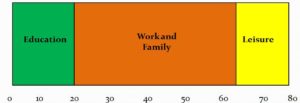Are You the Author of Your Life? Probably not.

Author: The person who originated or gave existence to anything and whose authorship determines responsibility for what was created. (Wikipedia)
Last week, I finished an excellent book by NPR journalist Barbara Bradley Hagerty “Life Reimagined: The Science, Art, and Opportunity of Midlife.” One page received my personal trifecta treatment for importance and follow up – totally highlighted, paper-clipped, and tabbed with a blue tab.
A comment by an Israeli psychiatrist, Carlo Strenger, earned the page that status:
“To become the author of our own lives, we need to accept that we have not chosen the base materials of who we are. We can only choose to shape them with a clear view of our strengths and weaknesses.”
It was the “author of our own lives” and the “base materials” part of the sentence that snagged me.
It took me back two quarter-centuries. Egad! What does it say when you can begin to think of your life in quarter centuries?
That was my college graduation year -1969.
After nine years and runs at three different majors, I made it to the stage to receive the faux-leather-bound document that is now God-knows-where. Enough credit-hours for at least one Master-degree illogically spread across civil engineering (one year), journalism (1 ½ years) and, finally, a B.S. in Business Administration (3 years).
 OK, I’m sure you did the math: 9 years minus 5 ½ years = 3 ½ years. Yep – a full third of a decade between college stints spent in aimless wandering and squandering while I confirmed that the male brain doesn’t reach maturity until around age 24 which was when I returned to campus for the final run.
OK, I’m sure you did the math: 9 years minus 5 ½ years = 3 ½ years. Yep – a full third of a decade between college stints spent in aimless wandering and squandering while I confirmed that the male brain doesn’t reach maturity until around age 24 which was when I returned to campus for the final run.
Base materials?
I may be a crowd of one, but I don’t recall a professor or advisor in my final months before graduation ever uttering anything resembling “author of your life”, “base materials” or “strengths and weaknesses.”
Conventional counsel at that point was to sign up for as many campus interviews as you can with the companies that offered the best combo of salary and location.
Look for a fit with my “base materials”? Uh, say what? Who knew I had any, least of all me.
So, I ended up leaving Wyoming for Pennsylvania and a career-launch selling ceiling tile.
Try that one on for excitement!!
The 20-40-20 Plan

I, and every campus compatriot I hung with, jumped on the same wagon and life-cycle plan. The one that prevailed then and still does. The one we had been indoctrinated into by parents, professors, and peers: 20 years of learning, 40 years of earning, 20 years of retirement nirvana.
Aside from some basic and mandatory IQ and basic skills tests in junior high and high school (which, BTW, suggested I should remain on my uncle’s Farmall driving in circles), I don’t recall ever being challenged to determine what my “base materials” were back then.
So the author for the first 20 years (27 for me) was cultural expectations: getta degree; getta job.
For the next forty, it was the same author but with the expectations ratcheted up: getta wife; getta house; getta family; getta mini-van; getta Labrador retriever; getta title; getta 401K; getta retirement.
Base materials, strengths and weaknesses be damned! Onward we marched because, well, that’s what we were expected to do. If latent, closeted desires or dreams tried to surface along the way, we tamped them down in favor of the model.
That is until we could no longer. For some, and increasingly common today, the model collapsed with a job loss. 
For others, it was an existential thing such as an internal force that calls for something with more meaning or realizing that we were at a professional dead end.
Strenger brings an interesting perspective to this. He says that “changing courses in midlife is not a luxury but an ‘existential necessity.’”
I’m a career coach working with professionals wrestling with a mid-life course correction – some by choice (internal), some not (external, as in blindside gut-punch). I’ve never suggested to a professional that has been gut-punched that they are going through an “existential necessity.”
Nor have I suggested that it’s time that they become the author of their life.
Maybe I need to get some guts about suggesting both. I think Strenger is onto something from his years of working with clients in transition.
He makes the point that if people are to thrive and not just survive in midlife, they must make the change. To fail to do so will exact a price.
Strenger states: “If people don’t take a hard look at what kind of changes they want to make, in the end, those changes are going to be forced on them. The basic idea is: Don’t wait until the changes are forced on you. Be proactive.”
What is that price if we don’t?
If life authorship has been relinquished to cultural expectations, there is a risk, in Strenger’s words, “of resigning ourselves to our growing limitations and throwing in the towel at 65” and “trudging on to retirement, something that almost no one can afford to do.”
In other words, succumbing to retirement – that ultimate casualty – when it’s likely there are 20-30 years of productive life left buoyed by an accumulation of assets built over forty, fifty, sixty years.
At mid-life, we have enough biography to know ourselves, what we’re good at and where we stink, what empowers us and what doesn’t.
Our choices become (1) letting that biography author us into the next phase honoring our essence (Strenger calls it our “thus and no other”) or (2) remain authorless, captive of cultural expectations, and accepting that we haven’t chosen the “base materials” of who we are.
Slow starter
Strenger’s words were “déjà vu all over again” for me. My “base materials” were closeted until I reached my 60s and, even then, slow to emerge.
Thirty-five years of meeting cultural expectations in the corporate world gave way at age sixty to an attempt at entrepreneurism by starting my own healthcare recruiting business. Within that experience came a gradual evolution that surfaced my “base materials” and “strengths and weaknesses” and the authoring of the life that I’ll finish out with – writing, coaching, teaching, speaking on issues involving achievement of a meaningful, fulfilling post-career life.
I can relate to how difficult it is to accept your “base materials” when they don’t line up with cultural indoctrinations. Despite what a plethora of personality and strengths assessments that I took through my 40s and 50s told me about myself, I rejected their consistent message and remained outside of my “base materials” for nearly four decades in favor of the cultural mold I stepped into in 1969.
Steering between Scylla and Charybdis
Strenger invokes the idiom from Greek mythology of sailing the strait between Scylla (six headed rock monster) and Charybdis (dangerous whirlpool) to make the point that a mid-life effort to recapture authorship and resurrect “base materials” calls for some careful steering.
He refers to Scylla as the choice of “resigning ourselves to our growing limitations and throwing in the towel at 65” (retirement) and Charybdis as “the illusion that, in midlife, we can enjoy ‘boundless change’ which requires a ground-up radical transformation” (the lawyer who becomes a chef or the doctor who becomes an organic farmer), the latter being “more seductive and more likely to flame out.”
Successfully steering between the two can come from putting accumulated skills and experiences up against innate – and perhaps, closeted – talents and dreams to see“how these can be reconfigured in a way that would be more appropriate to your needs today, that will be more satisfactory to you”, as Strenger suggests.
This can be tough!
This last year, I’ve had the good fortune to engage several mid-life C-suite healthcare executives who are in transition, most from an unexpected gut-punch that is common in this eternally volatile industry. Being laid-off unexpectedly at 52 or 55 or 58 and facing an increasingly difficult and competitive C-suite job market brings considerable angst. A lofty lifestyle combined with being sandwiched between kids in college and aging parents places “provision” ahead of “aspiration” for most. It’s rare for a conversation to head toward a discussion of “base materials” and anything other than hanging in with more of the same until time to throw in the towel, at or around 65.
It reminds me again of how much of a thief the number “65” is.





Thanks for the article. I guess I have been extremely lucky. I always wanted to be a nurse and it was never a question. My life has brought me more enjoyment and fun then I had ever anticipated. There were many challenges along the way but I learned from them and grew as a person. I have traveled internationally and in every state except 4 which I will do this summer. I have 3 great adult kids and their spouses and 5 grandkids who all ask to hang out with me. I hit 70 and still enjoy my work, play and relationships. Life has given me more then I ever could have imagined and I hope it will continue this way, more opportunities and more challenges!
I feel like I am the author of my life now, more than ever. I will be 60 in March and for the first time, I feel like I can actually write my own story. I have been frustrated my whole life by having to live a life that is dictated by society. It feels like wasted years. I went back to school at 54 and it was the best decision I ever made. This was a great article.
Happy New Year’s Gary I went off script my life did not follow that 20-40-20 graphic. Maybe my life is not a blockbuster best-seller but I can proudly say I am author, writer, director producer of my life. From observing my father’s rigid career, lack of any creativity I felt my father was not achieving his human potential that perspective taught me to explore every opportunity that came before me if that meant as a contractor, teacher, adult education trainer, financial educator I wore many different education hats I became a Jack of all Trades happy as a clam to travel across the country meeting new people before the Internet age. More proof my life to this point has not followed the herd is I do not have any children I do not own a home (AirBnB) or a car-Lyft is a life saver no need to own a car. Because I had no family of my own I was able to take career risks with no collateral damage so no one suffered because of my minimalist lifestyle. With minuscule student loan debt I was able to travel live in New York City, Boston, Washington DC, Chicago, Austin, Seattle, Miami. I wanted to be a respectable dancer did that now trying writing, living a creative life. There was no script to my life I had to improvise as I went from one position to another like a new chapter in my book it does not matter another couple of lines in my autobiography I am halfway through my story many interesting chapters ahead.
Thanks Phil.
Hi makeagingwork.com owner, You always provide useful tips and best practices.
Hi makeagingwork.com administrator, Your posts are always on point.
Hi makeagingwork.com webmaster, Thanks for the well-organized and comprehensive post!
Dear makeagingwork.com admin, Thanks for the educational content!
Hi makeagingwork.com webmaster, Your posts are always well-referenced and credible.
To the makeagingwork.com admin, You always provide useful information.
Hello makeagingwork.com owner, You always provide clear explanations and step-by-step instructions.